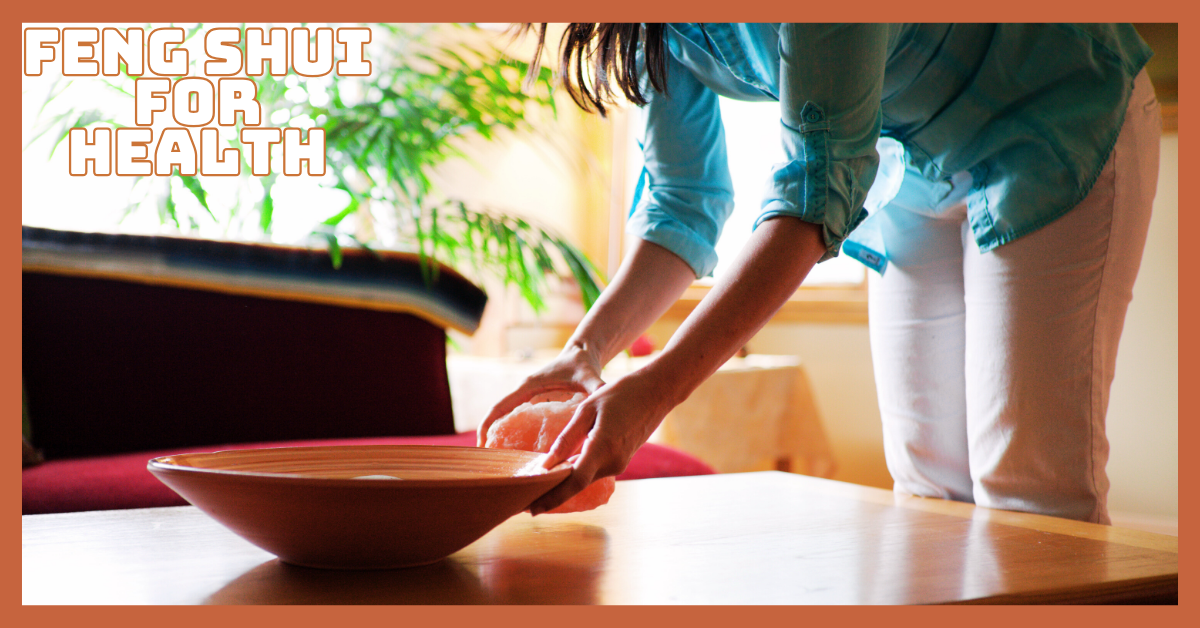Feng Shui For Health And Inner Peace
Feng Shui for health focuses on creating a living environment that supports physical vitality, emotional balance, and mental clarity.
You can lower stress, increase immunity, and enhance general well-being by arranging your home according to the traditional Feng Shui principles of colour, elements, and energy movement.
From bedroom placement to natural lighting and decluttering, simple adjustments can significantly impact your health. This guide explores how to harness Feng Shui to cultivate a space that nurtures healing and harmony in everyday life.
The Connection Between Feng Shui And Health
Feng Shui emphasizes that our environment shapes our energy—and by extension, our health. When energy (Chi) flows freely, we experience greater vitality, emotional balance, and well-being.
Here’s how Feng Shui impacts health:
1. Clutter Equals Stagnant Energy
Clutter disrupts the natural flow of Chi, causing stagnant, heavy energy to accumulate. This often leads to stress, low energy, and mental fog.
Clearing out unused, broken, or unnecessary items allows fresh energy to circulate, supporting emotional clarity, focus, and overall well-being.
2. Natural Light And Airflow
Natural light boosts serotonin levels, improving mood and mental health, while fresh air removes pollutants and replenishes oxygen.
Feng Shui emphasizes keeping windows unobstructed and rooms well-ventilated to ensure Chi flows freely, enhancing energy levels, sleep quality, and immune function.
3. Elemental Balance
Feng Shui links the five elements to specific organs and energies:
- Wood (growth, liver)
- Fire (vitality, heart)
- Earth (nourishment, stomach)
- Metal (clarity, lungs)
- Water (restoration, kidneys)
A balanced combination fosters internal harmony. Too much or too little of any element disrupts physical and emotional health.
4. Scientific Insight
Modern research supports Feng Shui’s principles. Studies show that environments designed for better energy flow reduce stress hormones like cortisol, promote restful sleep, and enhance emotional satisfaction.
Even simple changes—like decluttering or increasing natural light—can significantly improve psychological and physiological well-being.
Understanding The Foundations Of Feng Shui
Feng Shui (pronounced “fung shway”) means “wind and water.” Rooted in Taoist philosophy, it is based on the belief that everything in our surroundings affects our internal energy. Good Feng Shui creates harmony between you and your environment, promoting balance, peace, and good health.
1. Chi (Qi)
Chi, also spelled Qi, is the vital life energy that circulates through your body and environment. In Feng Shui, health depends on vibrant, unblocked chi that moves freely.
Chi can cause stress, exhaustion, or disease when it becomes sluggish, blocked, or excessively chaotic. Good Feng Shui ensures a continuous flow of clean, uplifting chi, which revitalizes your body, clears the mind, and supports emotional and spiritual well-being.
2. Yin And Yang
Dark and bright, soft and firm, passive and active—yin and yang are complementary opposites that symbolize balance in nature and life. Health is achieved when these forces are harmonized in your space.
A room that’s too bright or too dim, too noisy or too silent, can create an imbalance. Feng Shui encourages thoughtful design that balances Yin and Yang qualities to promote mental clarity, emotional calm, and physical well-being.
3. The Five Elements
The Five Elements—Wood, Fire, Earth, Metal, and Water—are fundamental in Feng Shui, and each one corresponds to specific body organs, emotions, and functions. A harmonious space includes a balance of all five, using colour, shape, and material.
For instance, Wood relates to growth and the liver, while Earth refers to stability and the stomach. Balancing these elements supports physical health, emotional resilience, and energetic equilibrium in your surroundings.
4. The Bagua Map
The Bagua Map is a Feng Shui energy map used to assess how different areas of a space relate to specific aspects of life, such as health, love, and wealth.
It divides a space into nine zones, with the health area located at the centre. By analyzing and enhancing each zone, especially the centre, you can bring targeted improvements to your life. This map serves as a practical tool to guide mindful arrangement and décor.
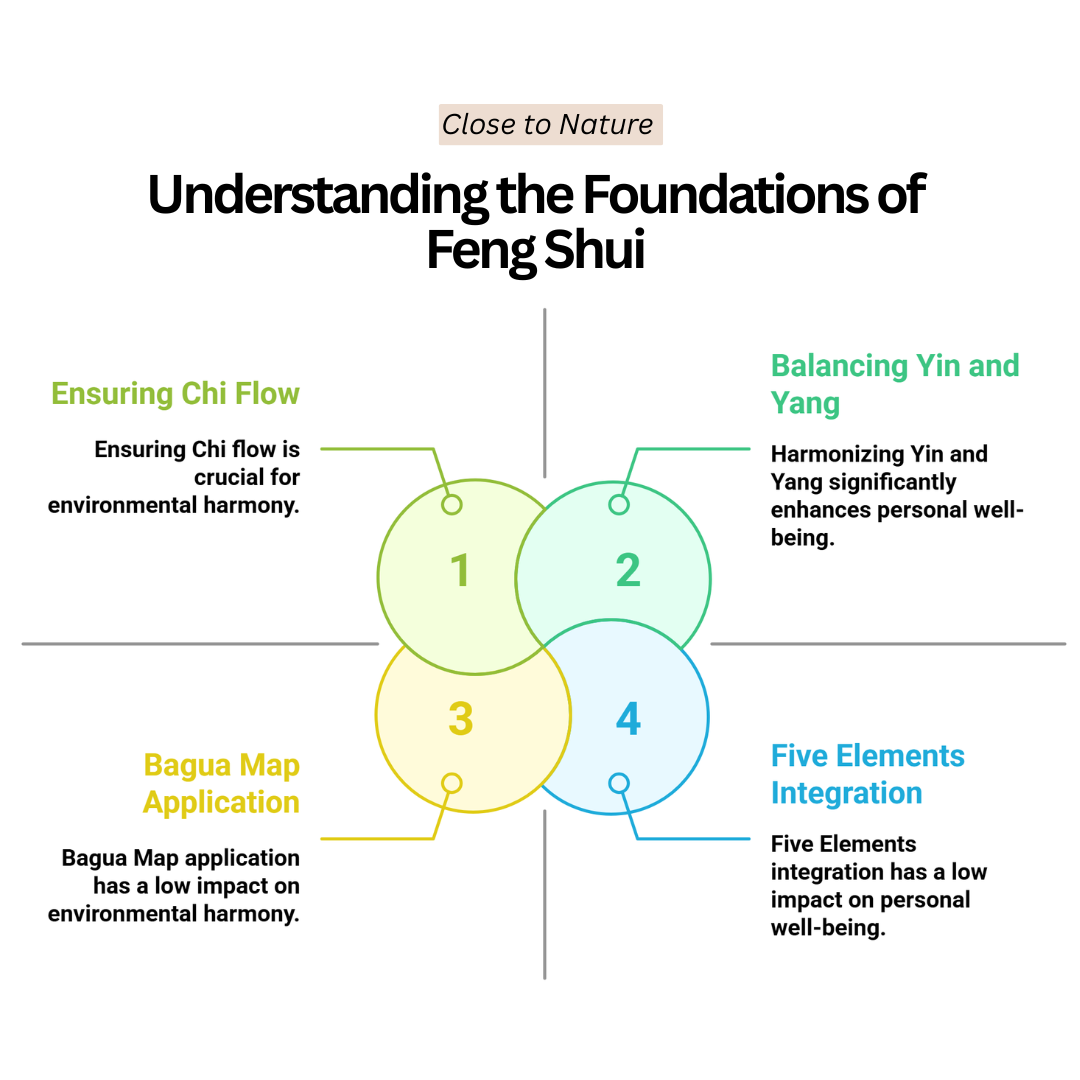
Feng Shui Tips For Health
Feng Shui for health focuses on designing spaces that enhance energy flow and promote overall well-being through balance and harmony.
By improving energy flow, reducing stressors, and balancing elements, you can create a home that nurtures physical, emotional, and mental health naturally.
1. Declutter For Better Energy Flow
According to Feng Shui, clutter obstructs the flow of Chi, producing stagnant energy that fuels weariness, stress, and mental haze.
Areas like under the bed, corners, closets, and behind doors are common spots where stagnant energy builds. When energy can’t circulate freely, it disrupts emotional and physical balance.
Decluttering clears these blockages, allowing positive energy to flow smoothly throughout your space. Start small—tackle one area at a time.
Let go of broken, outdated, or unused items. A clutter-free space not only looks better but also feels lighter, calmer, and more revitalizing for your health and well-being.
2. Strengthen The Health Area (Bagua Centre)
In Feng Shui, the centre of your home, known as the Tai Chi, is the health area. When this zone is vibrant and balanced, it supports overall wellness.
To activate it, incorporate elements that boost Earth energy. Yellow and earthy tones offer grounding and stability, while round shapes encourage unity and balance.
A small fountain adds movement and vitality, symbolizing a continuous flow of energy. Keep this area open, clean, and uncluttered.
Avoid placing heavy or sharp-edged furniture here, as it can disrupt harmony. Enhancing the Bagua centre aligns your entire home’s energy toward healing and equilibrium.
3. Optimize Your Bedroom For Deep Sleep
Your bedroom plays a crucial role in rest and rejuvenation. For a feeling of security and control, Feng Shui recommends positioning your bed in the “command position”—diagonal opposite the door but not directly in line with it.
Avoid mirrors facing the bed, as they reflect energy and can disturb sleep. Remove electronics to minimize EMF exposure, which disrupts natural sleep rhythms.
Feng Shui-based bedroom arrangement optimization promotes healthy sleep, lowers stress levels, and promotes general physical and mental renewal.
4. Use Plants For Fresh Chi & Air Purification
Plants are potent enhancers of life force energy. They purify the air, elevate mood, and improve energy flow. In Feng Shui, the Snake Plant is valued for its resilience and air-filtering abilities.
The Jade Plant symbolizes prosperity and good health, while Lucky Bamboo brings growth and harmony. Place plants in living areas, bedrooms, and health zones to increase oxygen and vitality.
Avoid keeping dead or dying plants, as they emit negative Chi and symbolize declining health. Taking good care of your plants regularly can improve your well-being, create a peaceful environment, and help you connect with the healing energy of nature.
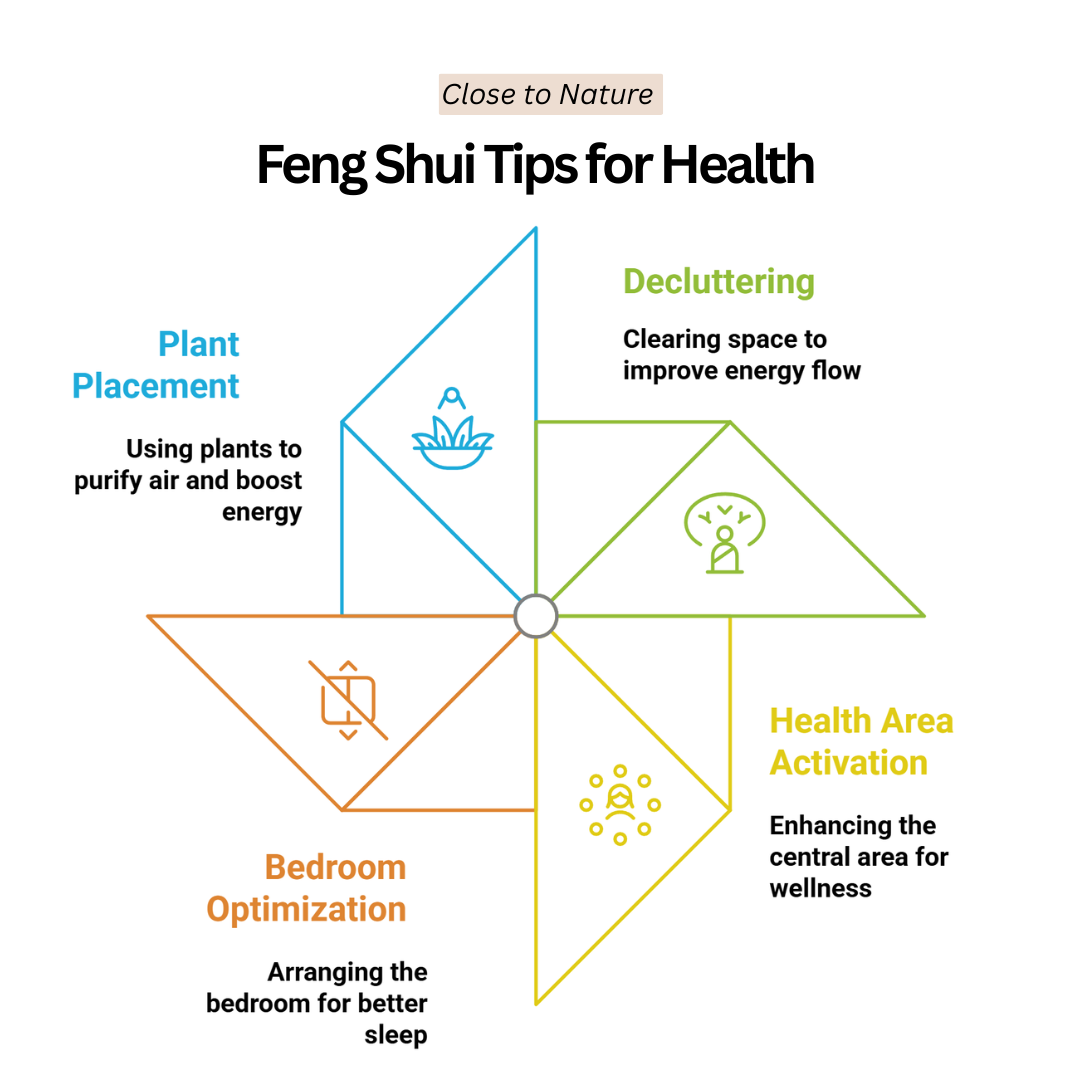
5. Balance The 5 Elements For Organ Health
The five Feng Shui elements—Wood, Fire, Earth, Metal, and Water—are linked to specific organs and emotions. Harmonizing these elements in your space supports physical and emotional health.
- Use Wood (green hues, plants, wood furniture) for liver health.
- Fire (red tones, candles) strengthens the heart.
- Earth (yellow, ceramics) supports digestion.
- Metal (white, metal decor) benefits the lungs.
- Water (mirrors, blues, flowing water) nourishes the kidneys.
An imbalance—too much of one, or lacking another—can lead to discomfort or illness.
Integrate all five elements mindfully in decor and layout to create a holistic, healing space aligned with your body’s internal energies.
6. Fix Leaks & Blocked Drains
Fixing leaks and ensuring smooth water flow is a key practice in Feng Shui for health, as it helps preserve energy, vitality, and overall well-being within the home.
Ignoring them can lead to fatigue, financial instability, or poor health. Promptly repair leaky faucets, blocked drains, and dripping pipes.
Keep toilet lids closed to prevent energy from being flushed away. Also, ensure good water flow in kitchens and bathrooms, as stagnant water can attract illness.
These minor fixes not only preserve physical resources but also energetically seal your environment, creating a more stable and health-supportive home.
Create a Profitable Holistic Business That Transforms Lives
🌿 Discover inspiring holistic business ideas that blend nature, wellness, and purpose.
Learn how passionate nature lovers are building income streams while helping others live more balanced, mindful lives.
Read Profitable Holistic Business Ideas That Transform Lives
7. Let Natural Light In
One of the primary sources of bright light is natural light. In addition to improving mood and regulating sleep patterns, sunlight also raises vitamin D, which is critical for healthy bones and immunity.
Feng Shui encourages homes to be bright and cheerful. Open windows and curtains each day to invite in fresh light and energy.
Clean windows regularly to prevent light from being blocked. In darker spaces or during cloudy seasons, use full-spectrum light bulbs that mimic daylight. A well-lit home uplifts your spirit, energizes your mind, and supports a more balanced, healthy life from within.
8. Use Healing Symbols
Symbols in Feng Shui act as energetic reminders and amplifiers of health and vitality. The Wu Lou (gourd), traditionally used to ward off illness, is perfect for the bedroom or health area.
The Citrine crystal radiates positivity and promotes personal energy, making it ideal for workspaces or desks. Using sound, a Tibetan singing bowl can release repressed energy and create a lively, tranquil environment.
Use these symbols intentionally—they don't just decorate but align your home with healing vibrations, uplifting your emotional and physical state every day.
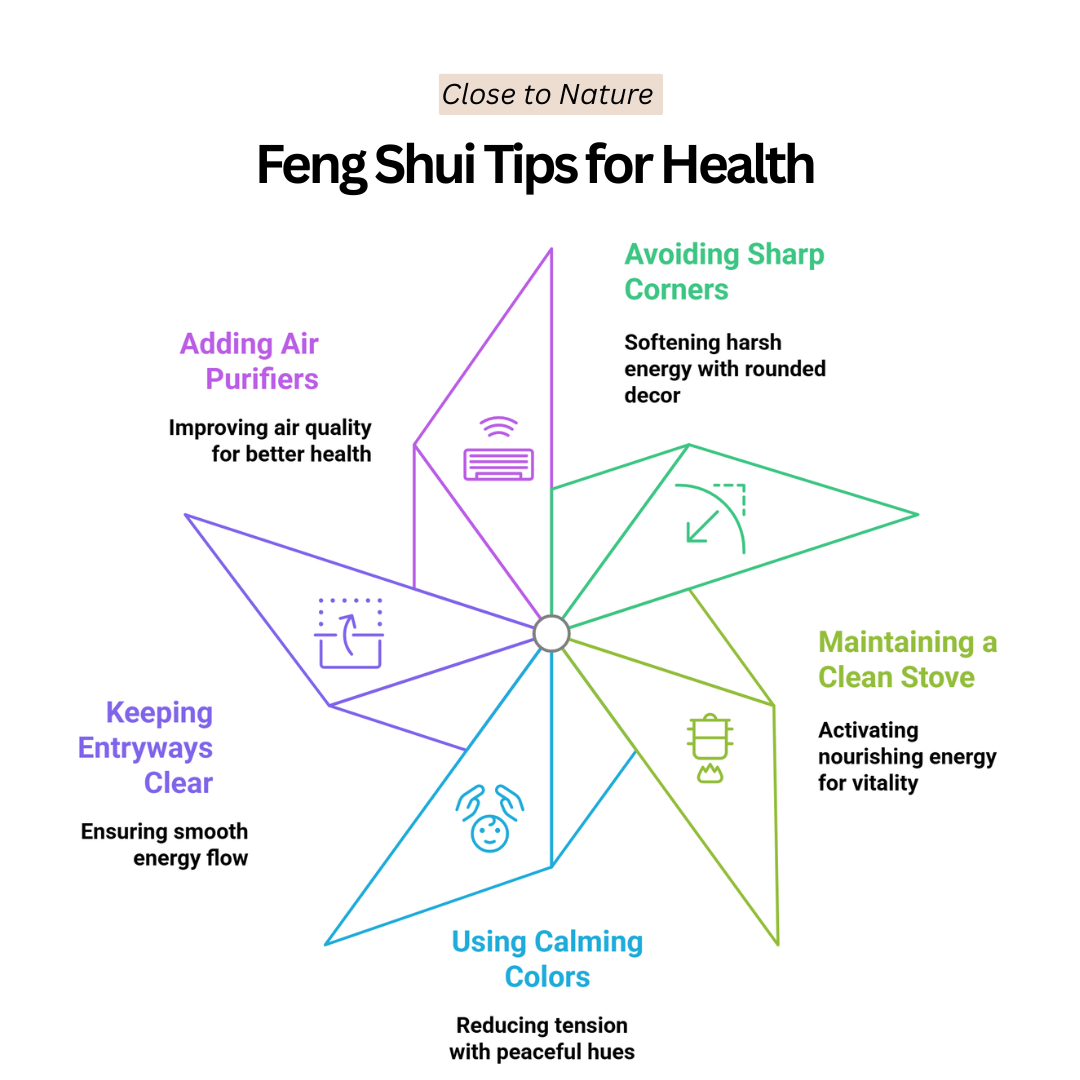
9. Avoid Sharp Corners Pointing At You
Sharp edges or corners—known as “poison arrows” in Feng Shui—emit harsh, cutting energy that can create stress, restlessness, or even health problems over time.
These are often found on furniture, walls, or architectural details pointing at sleeping or sitting areas. To soften their impact, place plants, fabrics, or rounded decor in their path.
Rounded furniture or edge covers can also help. Creating a gentler flow of energy in your space promotes relaxation and supports better health by reducing subtle, unconscious stressors in your daily environment.
10. Keep The Stove Clean & Used Regularly
In Feng Shui for health, maintaining a clean and regularly used stove activates nourishing energy that supports both physical well-being and financial vitality.
Even if you don’t cook daily, using the stove at least once a week, even for tea or simple meals, keeps this energy active. Keep all burners in good condition and rotate their use to promote balance.
A neglected or dirty stove reflects neglect of personal health. Make it a sacred space of nourishment to attract wellness and abundance into your life.
Explore more about Feng for Kitchens to Elevate your Cooking Space
11. Use Calming Colours In Stressful Areas
Using calming colours in key areas is vital in Feng Shui for health, as it reduces tension and fosters tranquillity. This peaceful atmosphere supports both physical and mental well-being.
These hues soothe the nervous system, promote emotional balance, and help reduce anxiety. Avoid intense reds, bright neons, or dark shades in these areas, as they can overstimulate the mind or feel heavy.
Incorporating calming colours through paint, décor, bedding, or artwork creates a serene, supportive environment that promotes restful sleep, lower stress levels, and overall emotional well-being.
Learn more about Feng Shui Colours
12. Keep Entryways Clear
The front door is the main way that energy enters your house and is referred to as the “mouth of Chi.” A blocked or cluttered entryway hinders energy flow, limiting health, opportunity, and prosperity.
Keep this space clean, well-lit, and welcoming. Avoid placing shoes, furniture, or trash bins directly in front of the door. Add a small rug, a healthy plant, or a symbol of vitality like a welcome sign or wind chime to attract fresh Chi.
A clear, inviting entrance sets the tone for the energy that circulates throughout your home and body, supporting mental clarity and good health.
13. Add A Salt Lamp Or Air Purifier
Air quality plays a crucial role in physical health and Chi circulation. Himalayan salt lamps are natural ionizers that help neutralize pollutants and create a warm, calming glow.
They reduce allergens, boost mood, and create a healing environment. If a salt lamp isn’t available, consider using an air purifier to remove dust, mould, pet dander, and other irritants from your space.
Clean air supports better breathing, immune health, and overall wellness. Place the lamp or purifier in commonly used spaces like bedrooms or living areas to enhance energy flow and support holistic health.
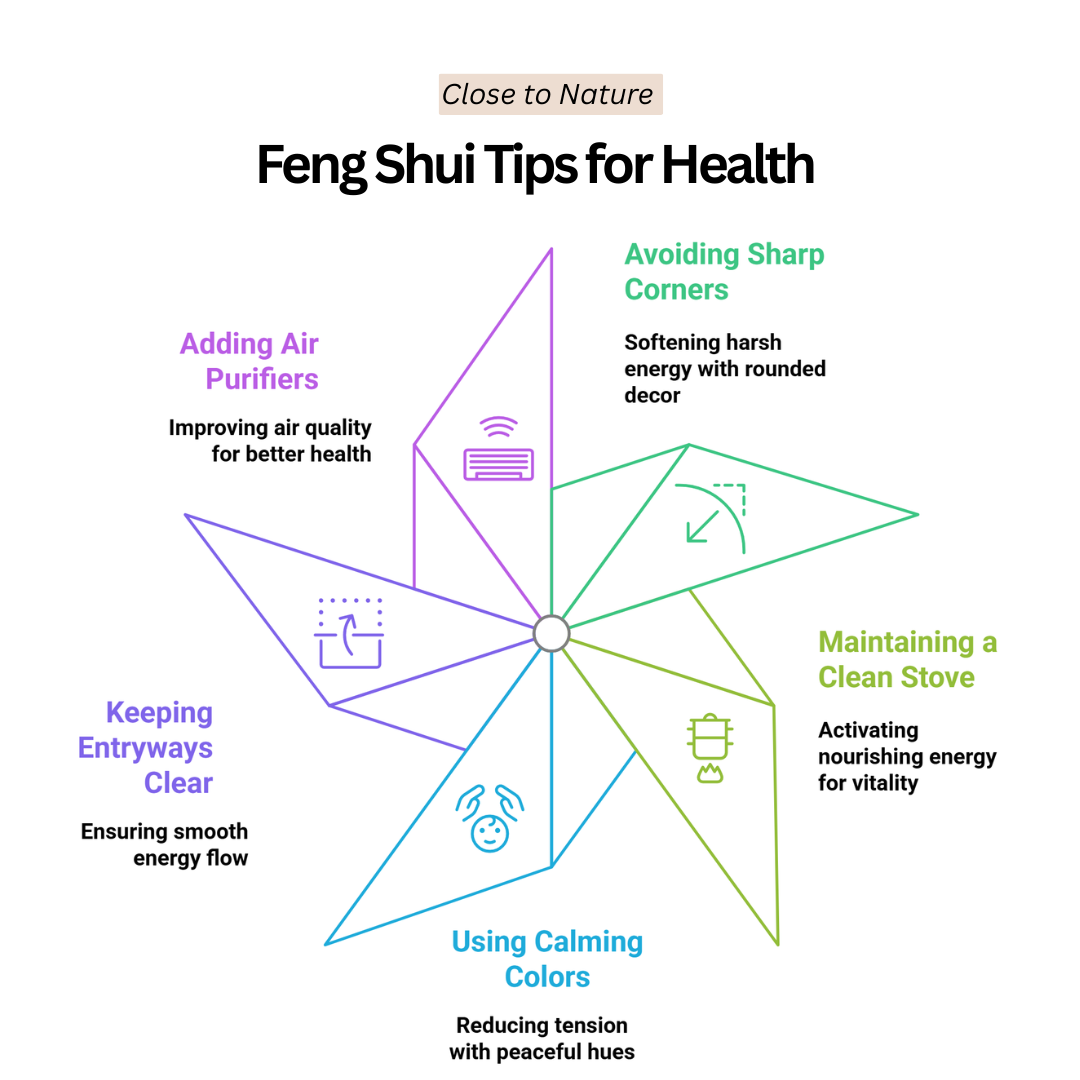
Common Mistakes And Smart Fixes
Avoiding common Feng Shui for health mistakes is essential to maintaining a home environment that nurtures energy, balance, and overall well-being.
Here are some common Feng Shui mistakes for health and how to avoid them to ensure your home supports well-being, energy, and vitality:
1. Cluttered Spaces
Mistake
Clutter blocks the free flow of Chi, creating stagnant energy that can cause stress, fatigue, and confusion. It weighs down your mental and emotional state, mainly when found in key areas like bedrooms or the home’s centre. Hidden clutter, like under beds or behind doors, can also affect health.
How To Avoid
Declutter regularly and mindfully. Keep floors clear, especially under furniture. Donate or discard unused items. Create organized storage solutions and avoid piling things in corners.
Make space for energy to circulate freely. A clutter-free space supports clearer thinking, better rest, and improved overall wellness.
2. Sleeping Under Beams Or A Window
Mistake
Sleeping directly under beams or with your head beneath a window creates a sense of pressure and vulnerability, which may disturb restful sleep and drain personal energy. Beams symbolically “cut” through energy, while windows can make you feel unprotected or exposed during rest.
How To Avoid
Rearrange your bed so it’s not under any beams or windows. If unavoidable, use a solid headboard, heavy curtains, or canopy fabric to provide energetic support and safety.
This change fosters better sleep, emotional balance, and physical rejuvenation by minimizing pressure and external influences.
3. Ignoring The Centre Of The Home
Mistake
The centre, or Tai Chi, influences the health of all occupants. If it's cluttered, dark, or energetically neglected, health issues may arise. In 2025, the Illness Star resides here, making it more important to balance and care for this space to prevent sickness.
How To Avoid
Keep the centre clean, open, and free of heavy furniture or clutter. Add metal elements like brass bowls or a singing bowl to weaken illness energy.
Avoid red tones here in 2025. Enhancing this area supports overall vitality and balances health energy for the entire household.
4. Mirrors Facing The Bed
Mistake
Mirrors reflecting your body while sleeping can create restlessness, anxiety, and even disturbed dreams. They bounce energy around the room, which disrupts the calm environment needed for restful sleep and healing. They may also symbolically invite a “third party” into relationships.
How To Avoid
In Feng Shui for health, removing or covering mirrors that face the bed supports restful sleep and protects your energy while you rest. Choose calming artwork instead.
Creating a soft, mirror-free sleep space encourages more profound relaxation, emotional calm, and better restoration of energy during sleep.
5. Blocked Front Door (Mouth Of Chi)
Mistake
A cluttered or poorly maintained entrance limits the flow of new, positive energy into the home. Since the front door is the “mouth of Chi,” this can lead to stagnation, missed opportunities, and weakened vitality for those living inside the home.
How To Avoid
Ensure the front entrance is well-lit, open, and clutter-free. Sweep the area regularly, remove dead plants or broken items, and make it welcoming with a doormat or wind chime. An open, energized entryway allows vibrant Chi to nourish your home and health.
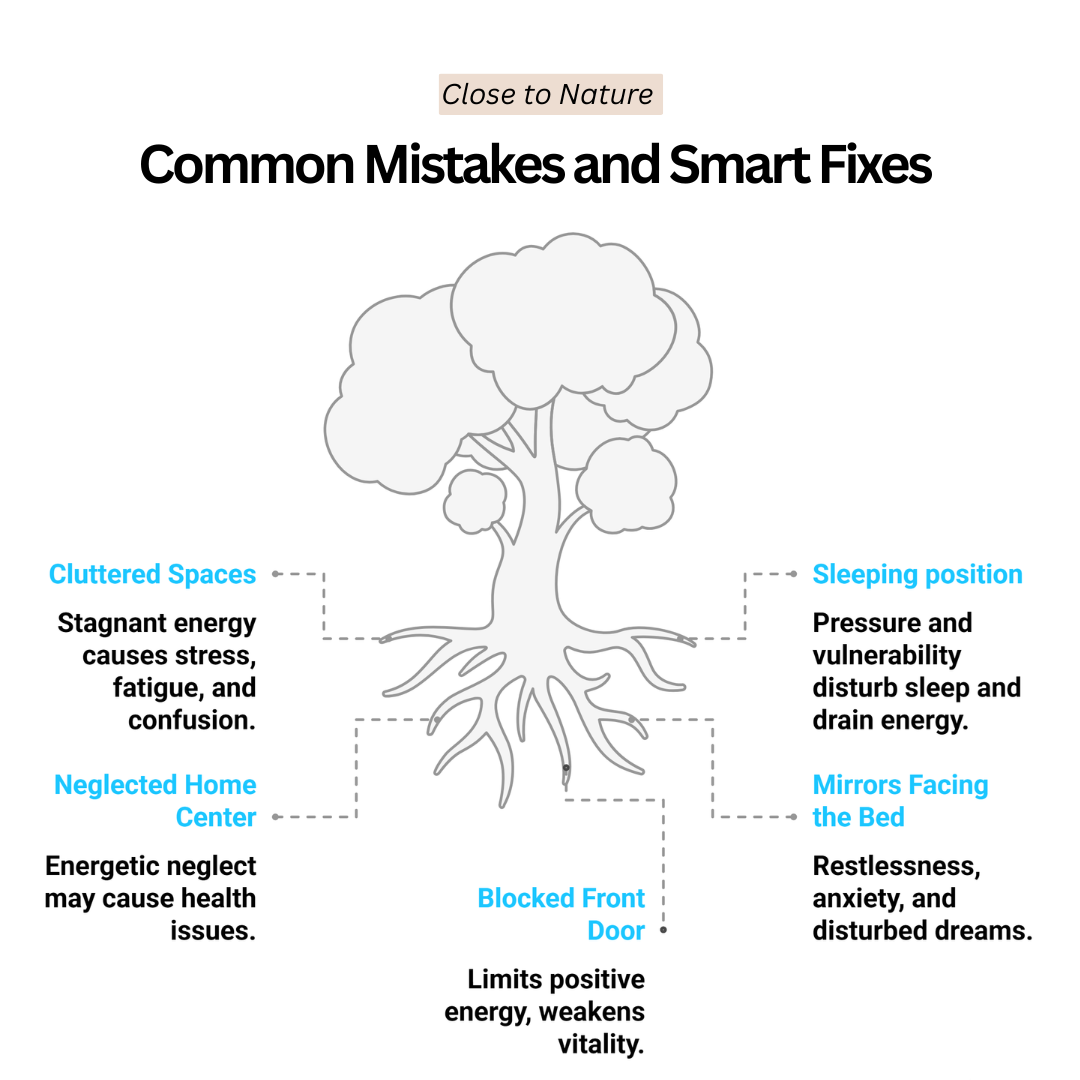
Conclusion
Feng Shui for health is about creating a balanced, supportive space that nurtures your body, mind, and spirit. By aligning your environment with natural energy flow, you can reduce stress, enhance well-being, and promote healing.
Small changes—like decluttering, adding natural light, or balancing elements—can have a powerful impact. When your surroundings support vitality and peace, your health naturally improves. Embrace Feng Shui as a daily practice to cultivate harmony, wellness, and a more vibrant life.
I trust you enjoyed this article on Feng Shui For Health And Inner Peace. Please stay tuned for more inspiring guides, helpful tips, and ideas to help you live closer to nature every day.
Take care!
— JeannetteZ🌿
💬 Your Opinion Is Important To Me
Do you have thoughts, ideas, or questions? I’d love to hear from you. Please leave your comments below or email me directly at Jeannette@Close-To-Nature.org.
📚 More Nature-Inspired Reads
Explore more ways to connect with nature, nurture your pets, and live in harmony with the world around you 🌿

